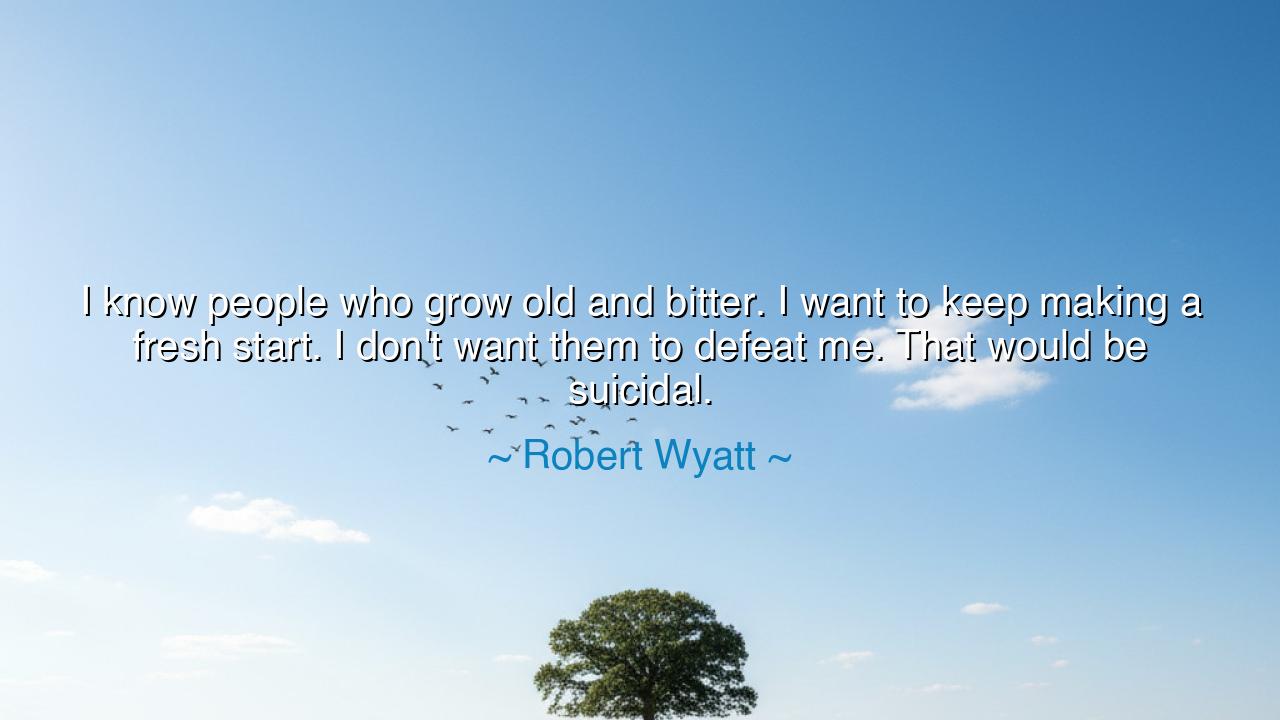
I know people who grow old and bitter. I want to keep making a
I know people who grow old and bitter. I want to keep making a fresh start. I don't want them to defeat me. That would be suicidal.






Hear the voice of Robert Wyatt, the musician who, though broken in body, remained unbroken in spirit. He declared: “I know people who grow old and bitter. I want to keep making a fresh start. I don't want them to defeat me. That would be suicidal.” In these words lies a flame of defiance, a sacred cry against despair. He teaches us that bitterness is not the natural fruit of age, but the corruption of the heart when hope is abandoned. To grow old is inevitable, but to grow bitter is a choice—a slow poisoning of the soul.
In the ancient way, bitterness was seen as rust upon the spirit, eating away at joy, corroding the bonds between man and his fellows. It creeps in silently, feeding on disappointment and envy, until the heart becomes a stone. But Wyatt lifts the banner of fresh beginnings. He reminds us that each day is a chance to start anew, to breathe life into weary bones, to refuse the chains of the past. To surrender to bitterness is to die before death, to commit a kind of suicide of the spirit.
Consider the story of Marcus Aurelius, the philosopher-emperor of Rome. Surrounded by treachery, plagued by war, pressed by the weight of empire, he could have grown bitter and cold. Yet in his writings he exhorts himself daily to begin again, to live with virtue, to guard the soul against resentment. He teaches that the enemy is not hardship, but the soul’s own surrender to bitterness. In this he stands with Wyatt, declaring that renewal must be chosen, even in the final years of life.
Contrast this with the tale of those who hardened in age, clinging to resentment like armor. Think of King Lear, who in his blindness and pride cast out his faithful daughter, only to be left broken and embittered. His downfall was not in age itself, but in his refusal to seek a new beginning when folly was revealed. Thus, his spirit crumbled, and his bitterness led him to ruin. The lesson is stark: bitterness is a defeat greater than any inflicted by others, for it comes from within.
Wyatt’s own life speaks louder than his words. After the accident that left him paralyzed, he could have withdrawn into despair, a man imprisoned by bitterness. Yet he chose music again. He chose to create, to sing, to transform his pain into beauty. In his art, he made a fresh start, not once, but again and again. His defiance was not against fate, but against bitterness itself. He knew that surrendering to it would be a true death, even as his body still breathed.
So what must you learn, O listener of this wisdom? Guard your heart against the creeping shadow of resentment. Do not let age, failure, or loss harden you into stone. Each dawn is an invitation to begin anew. Make it your practice to forgive swiftly, to release what weighs upon the heart, and to seek fresh creation in your life—whether in art, in love, in service, or in the smallest act of kindness. To choose bitterness is to choose defeat; to choose renewal is to choose life.
Practical steps stand before you: reflect each evening, and ask, “Where has bitterness touched me today?” Root it out before it takes hold. In hardship, search not for reasons to curse, but for ways to begin again. Create something small each day, a word, a gesture, a thought of gratitude, that affirms your refusal to be conquered by despair. Surround yourself with those who choose life, not bitterness, for the company of the bitter can infect the soul like disease.
Thus remember Wyatt’s teaching: bitterness is defeat, renewal is victory. To make a fresh start is not weakness, but the highest courage. For the one who rises anew, no matter how many times they have fallen, is unconquerable. Let not the years defeat you. Begin again, and again, and again—until your last breath sings not of bitterness, but of life fully lived.






AAdministratorAdministrator
Welcome, honored guests. Please leave a comment, we will respond soon